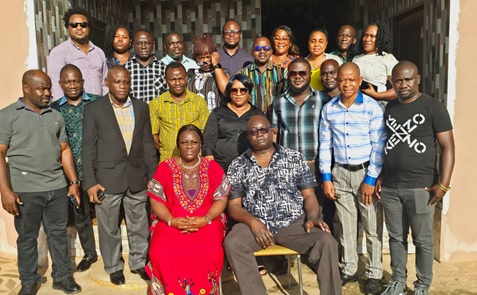MONROVIA – The Liberia Medicines and Health Products Regulatory Authority (LMHRA), in collaboration with the Promoting the Quality of Medicines Plus (PQM+) program funded by the United States Agency for International Development (USAID) and led by the U.S. Pharmacopeia (USP), has supported the drafting of eight new regulations and reviewed the authority’s 2010 Act.
During a week-long retreat in Buchanan, Grand Bassa County, LMHRA Managing Director Dr. Luke Bawo emphasized the importance of updating the existing Act, noting that the 2010 legislation failed to address several critical areas, including new regulatory roles.
Dr. Bawo outlined key issues not covered in the current Act, such as the decentralization of LMHRA’s operations across Liberia, the establishment of roles for the Deputy Managing Director and Directors, enhancements to the Quality Control Laboratory, international harmonization, and various administrative and regulatory matters.
Dr. Michael Chu Nepay, LMHRA Programs & Planning Coordinator, provided insights into the retreat’s objectives, which focused on drafting modern pharmaceutical regulations to improve LMHRA’s policies for regulating medicines and health products in Liberia.
As the statutory body of the Government of Liberia, LMHRA is tasked with ensuring the safety, efficacy, and quality of all medicines and health products available in the country.
Theophilius Ndorbor, Senior Program Manager at PQM+, noted that since LMHRA’s establishment, USAID has supported the development of twenty-one regulations, with eleven currently in effect and eight under review. He highlighted the significance of PQM+ training initiatives in dossier evaluation and the enhancement of the Quality Control Laboratory’s capabilities for compendia testing.
Ndorbor recalled that a fire in 2017 destroyed the only High-Performance Liquid Chromatography (HPLC) machine provided by USP. Fortunately, a new HPLC machine has been operational for compendia testing at the Quality Control Laboratory since 2023.
He also mentioned that PQM+ has conducted four rounds of Post-Market Surveillance (PMS) since 2021, significantly reducing product failure rates from a high percentage to as low as 2 percent.
Additionally, Ndorbor highlighted PQM+’s support to the Global Pharmaceutical Manufacturing Company in achieving compliance with Good Manufacturing Practices (GMP), enabling LMHRA to issue a manufacturing license for quality medication production in Liberia.
“As we review these regulations and the Act, let’s work together to ensure a positive impact on Liberia’s pharmaceutical sector over the next decade,” he stated.
Following the retreat, Dr. Bawo expressed gratitude to USAID, the World Health Organization (WHO), and other partners for their invaluable contributions. He also thanked the Government of Liberia, particularly the Ministry of Health and the Law Reform Commission, as well as LMHRA staff for their collaborative efforts during the review process.
Malayah Chieyoe, Deputy Health Minister for Planning & Policy, congratulated all participants involved in the regulatory and Act reviews. On behalf of Health Minister Dr. Louise Kpoto, he reaffirmed the Ministry’s strong support for LMHRA.
Chieyoe expressed confidence that the collaborative efforts of LMHRA’s management and partners would lead to significant health improvements for Liberia’s citizens, aligning with President Joseph Nuymah Boakai’s ARREST Agenda.
In her closing remarks, LMHRA Deputy Managing Director Dr. Patricia Quaye-Freeman commended the participants for their open-minded collaboration aimed at developing regulations and guidelines that will enhance health outcomes for the Liberian population once enacted.
The drafted regulations include provisions defining the roles and responsibilities of various institutions within the regulatory framework, regulations addressing complaints and appeals against regulatory decisions, and guidelines for publishing deferred and rejected products. Additional regulations focus on qualifying Reference Standards, recognizing decisions from other National Regulatory Authorities, and implementing risk-based post-market surveillance practices. Other regulations under development pertain to Good Distribution Practice (GDP) and Good Storage Practice (GSP) inspections.







